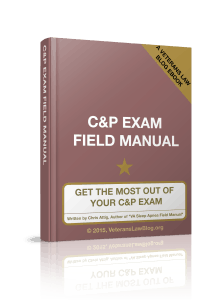At some point in the VA Claims Process, VA will likely send your claim out for a Compensation and Pension Exam (C&P Exam).
And a good number of times, they are going to send you to a nurse practitioner or a physician’s assistant and NOT a medical doctor.
Before going any further, this post is NOT a dig on nurses. Nor am I suggesting that nurses are not competent medical professionals. Not by a long shot. Without nurses, doctors wouldn’t be able to do a darn thing.
What I am saying in this post is this: in the VA Benefits system, nurse practitioners and physicians assistants should NOT be presumed competent to render medical opinions in a Compensation and Pension Exam.
What is the Purpose of the VA Compensation and Pension Exam?
The purpose of the Compensation and Pension Exam – in theory – is to determine whether your particular medical condition is related to your military service or the degree to which it causes a functional impairment of your earning capacity.
There are, generally, 3 types of C&Ps: the nexus exam, the “diagnostic” Compensation and Pension Exam (one where the VHA will diagnose the current condition you claim is related to your military service), and the “rating” exam, where your limitation will be evaluated for rating calculation purposes.
For those of us who have been at this for a while, we know that VA doesn’t always send you to a medical expert with experience in your specific disease or the body system affected by the disease. Sometimes, they send you to a doctor, sometimes to a licensed social worker, sometimes even to residents (doctors who have only recently graduated med school).
Does the VA have to Prove the Compensation and Pension Examiner has the Right Expertise?
Curiously – particularly for a system meant to be non-adversarial – the Veteran always has to prove the credentials of a medical examiner, but VA does not.
In fact, under the “presumption of regularity”, VA is presumed to have chosen the best medical practitioner for the job.
This is one of the not-so-subtle ways that “junk science” has crept into the VA Benefits system – doctors without knowledge or experience or expertise (and in some cases, folks that arent doctors at all) are offering medical opinions that are “presumed” competent because the VA said they are competent.
In the case of one Veteran, the Federal Circuit Court of Appeals was asked to look at a Compensation and Pension Exam where a nurse practitioner rendered the C&P opinion.
The nurse practitioner, whose experience was limited to family medicine, was asked by VA to provide a compensation and pension exam and then render a medical opinion as to whether a particular group of chemicals used in a Top Secret project called “Project 112” could cause diabetes.*
Not surprisingly, the opinion from the compensation and pension exam concluded that “it was at least as likely that they did not” cause diabetes.
The US Court of Appeals for the Federal Circuit looked at the matter and gave veterans a little bit of guidance.
The Court said that first, a veteran has to object to the credentials of the medical examiner.
If the veteran – whether pro se or represented by a VSO – does not object to the qualifications of the author of the opinion, then the presumption of regularity attaches and the author is presumed competent.
By the way, this does not work in reverse. If YOU chose a medical practitioner to offer an opinion in your case, you have to establish that expert’s legal competence. There is no presumption that YOUR medical doctor is an expert.
So, how do you object to the credentials of a medical practitioner?
First, you have to know who the practitioner is. Here are some simple steps for veterans to follow to find out this information.
1) While at your Compensation and Pension Exam, ask for the Doctor’s name, states of licensure and, if (s)he has one handy, a copy of his/her CV. Be diplomatic about this – many C&P doctors have fragile egos and will view this as a pre-emptive strike attacking their credentials. Be polite, and when asked, just let them know that you want to keep this information in your file for record keeping purpose.
2) If you have concerns about the practitioner’s experience or qualifications: object to the credentials of the medical practitioner. If you have a filing due – a Notice of Disagreement or VA Form 9, for example – it is critical that you raise your objection in that filing. If you do it separately from your filing, VA may construe that objection as the NOD or VA Form 9 and bar future appeals on other issues, so just do it all at once. You can use more formal language like this, or you can just add some simple words like this (this is the bare minimum that should appear in EVERY veteran’s Notice of Disagreement or VA Form 9:
I object to the VA’s selection of a medical examiner in this claim and appeal. I would like to raise a specific challenge to the competence, qualifications, methodology or conclusion of the examiner, but cannot do so without certain information. I request that you send me copies of the examiner’s resume or CV, VA credentialing documents, and any other evidence establishing he (or she) is legally competent to render an opinion in this case. Please construe this as a request under the FOIA/Privacy Act, and recall that under 38 C.F.R. §20.1200 you must process and respond to this FOIA/Privacy Act Request prior to issuing any decision on appeal.
3) Request a copy of the C&P Exam and VA Form 2507 immediately (VA Form 2507 is the form that the VBA used to use, and in some cases still does, to request a C&P Exam from the VHA). You can get this form by calling – or better yet – walking into the records department of the VA Medical Center where the exam was provided.
4) When you get the 2507 and Compensation and Pension Exam notes, the medical provider’s name should be listed in the report.
5) Do a “Google Search” of the medical provider, to see if you can find anything about him or her online; send any information you found that you believe undercuts the legal competence, qualifications, methodology or conclusion of the examiner or his or her opinion as Exhibits attached to your Notice of Disagreement or VA Form 9.
Once you have this information, supplement your objection with the details you learned in the provider’s resume. Click on this link to read for some GREAT language to include in your NOD to challenge the credentials of any C&P Examiner.
The presumption of regularity will be discussed in another post, so check back for details on how to make the argument in the context of overcoming that presumption.
Footnotes:
* Project 112 (SHAD): Soldiers were intentionally exposed, onboard Navy ships, to chemical and biological agents to test the defenses of the Navy’s warships against chemical and biological attack. The Department of Defense has repeatedly lied about what the soldiers in these tests were exposed to – up until very recently telling them they were only expose to simulated chemicals.
** While DAV employees are – usually – good for processing initial claims, the DAV’s value in the appellate process is – at least to this attorney – questionable. If I had a nickel for every legal argument that DAV missed on appeal, I would have enough nickels to buy a seat in Congress. The Vets that DAV represented would probably have received more past-due benefits, as well, if they were represented by professional advocates.








Thank you for this post… My husband is a disabled Veteran and we recently had to fight a C & P exam. The first exam lasted 10 minutes and the new over a hour and the nurse (first exam) noted “no assisted devices uses”…but in his VA records, he has been given assisted devices and wheeled into the exam with his cane in hand to walk. The second exam every device he has was noted. I don’t even want to get into the rest of the botched exam, but will say the first exam made it sound like he could run and dance (I wish). Luckily we didn’t have to fight it using this information to get a new exam, but we are still fighting to get A & A…3 years now and so much more.
I’m sorry to hear you had such a negative experience – although it sounds “par for the course” with VA Compensation and pension exams.
Good luck on A&A!
Chris
Thanks…I am an attorney and disabled veteran and this is not my area of expertise and am lost. One thing that got me was how one evaluator said no TBI and another gave me 10% for headaches caused by head injury on active duty….how bout them apples. LOL
I would say “unbelievable”, but it is the VA, so it is completely believable.
Chris
Thanks, Chris. Not only has my premium membership kicked in, but I find it eminently worthwhile, even after just this one little article… Keep up the good work AND the FAITH IN GOD SAVING AND PRESERVING US! The VA may fail US left, right & center, but He never will… Guaranteed, Buddy. And you know Texas Jesus saves ALL Texans who call on Him, too, man. Like clockwork…
Thanks
So is there any kinda statute o limitations on how long a client can let it go and still rebut the presumption of “qualified to render an expert medical opinion”? I have one of these Minnesota cases where they had a NP do exams for TBIs…
Thanks, man
Roger,
I can’t advise on your case, as you know these things are very fact specific. The rebuttal of the expert’s qualifications/opinions should be asserted in the NOD and continued in the VA9 and any BVA Pre-hearing submissions. I think it would be extremely difficult to allege CUE on these grounds if you miss an appeal deadline.
Chris
Glad it helped, Roger! Always like to see that my writing and teaching is educating Vets to improve their own claims and appeals.
Chris
I’m Appealing my P.T.S.D. RAT OF 30% FOR AN INCREASE TO 100 %.